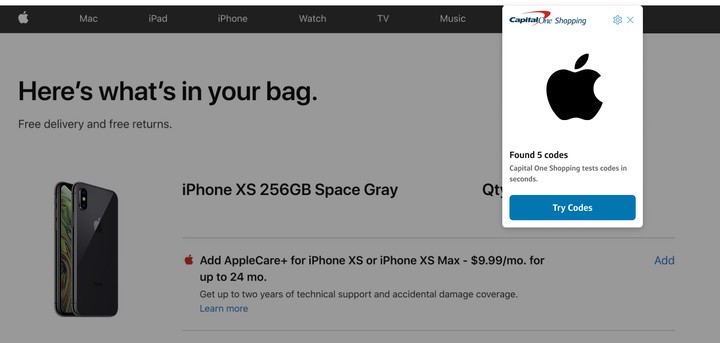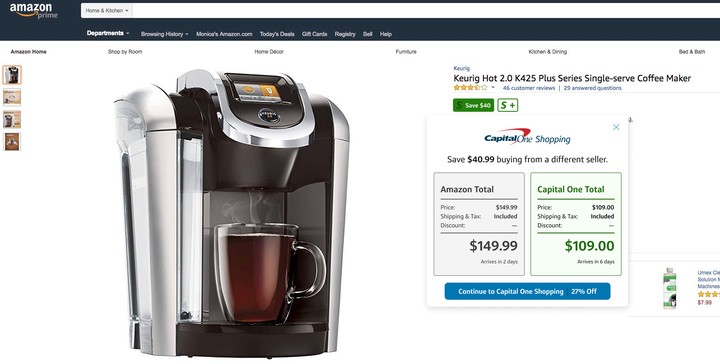Coupon Marketing Is About To Face An Armageddon
For a long time eCommerce websites have utilized coupons to incentivize first time customers, track referrals from influencers, and conduct short term sales only advertised via email or social media. I foresee a big shake up in the near future.
Table of Contents
The New Threat Facing ECommerce Companies
In the last decade we've seen the explosion of coupon aggregators in the marketplace. There are the big ones you have probably heard of like Honey, CapitalOne Shopping, Coupert, and Karma but you probably are unaware of just how many there are. I have a tracking document with about 60 of them listed.
These services promise to find and catalog coupon codes for web stores and make them available to you when you are shopping. In many cases they encourage the installation of a browser extension or app that will even go so far as to prompt you when you are checking out on a site that they may have coupon codes they can inject for you. One click of a button and presto you are saving money.

I get the appeal for the shopper and consumer. Sounds fabulous. For the web store business, not so much.
How Coupon Aggregators Get The Coupon Codes
There are a few ways these companies effectively scrape the internet for coupon codes.
First, their browser extension “sees” and copies codes being manually added. For example, imagine you have the Honey browser extension installed because you like saving money. You are also on my email list and I email you about a sale we are doing this week to celebrate National Park Week. In the email I provide a coupon code.
You visit my site and place an order. During checkout you manually type in the coupon code that was in the email onto the checkout page. Presto, Honey now has cataloged that coupon code and then next user to come to the site will be prompted to add that coupon code to checkout even though they were never on my email list and otherwise were unaware of the sale we advertised to our email subscribers.
In addition, people can manually submit coupon codes to these services.
The above example about National Park Week is a real story. Sent out the coupon code on a Monday and by Tuesday CapitalOne Shopping had the code indexed and was prompting users to inject it on my site. This also suggests that swapping out codes often isn't a real solution. It takes almost no time for them to be compromised.
Coupon Campaigns Are Now Unreliable
Businesses often generate coupon codes for influencers. The influencer then can promote a discount to their followers and audience. This allows the company to more or less track the referrals that are coming from that influencer and better leverage their audience by using a discount as an incentive to buy.
Or perhaps a company creates a coupon code as a way to gather email leads. You land on the site and it pops up asking you to put in your email address to receive a first time buyer coupon code.
These are the kinds of activities that are now effectively corrupted by coupon aggregators. There is no way of knowing if a recent order with a specific coupon code came through the promotional efforts of the marketing campaign / influencer or if that code was scraped up by an aggregator and is being inserted into orders that otherwise would have been received without any discount.
If You Don't Want To Provide A Discount, Don't Give Out A Coupon
I've been told this by a few people. Afterall, if we aren't willing to deal with orders coming in with a coupon attached why did we generate the coupon code to begin with? Well it isn't that simple.
First, as a business we accept when we hand out a coupon code that it will be added to orders associated with that marketing campaign… but not other orders. If someone comes to the site and plans to place an order regardless of getting a discount but their browser extension hands it to them regardless that is money the company would have received but now they won't and even worse they are assuming that the order came by way of a marketing campaign to which that coupon code was assigned.
This skews the marketing data and causes significant waste in marketing efforts and advertising dollars which further hurts the business.
Yes, we accept the idea that there is going to be some profit lost when we promote a coupon code but speaking for my business we can't afford it if a large % of orders all have a coupon code attached that otherwise wouldn't if it were not for these coupon injector apps.
However, one potential solution to this challenge is to stop utilizing coupons in marketing at all. It would be difficult and ultimately probably less good for the consumers.
How Are These Coupon Aggregators Making Money?
You might be wondering why there are so many of these services and how they make money. The answer actually helps you to understand how these are an even greater problem for businesses.
It comes down to affiliate marketing and affiliate programs.
These days most online retailers have affiliate programs. An affiliate program is an effective way to work with influencers, marketers, and publishers to incentivize them to send you customers. Different from providing a coupon code, an affiliate program may or may not provide any discount to the end customer but does generate a commission to the affiliate who referred the sale.
Affiliate marketing is another marketing avenue and potential stream of income. These coupon aggregators sign up for affiliate programs for all the web stores they can. Then, when you use their service, extension, or app, they redirect you to the web site using their affiliate link.
Let me give an example. You are on one of my websites about to place an order. You get to the checkout page and your coupon app tells you it has potential coupons it can insert into this website. You click the button to prompt it to try the coupon codes. First, it refreshes the page in your browser redirecting you through its affiliate link. So now, regardless if the coupon codes work or not they are going to earn a commission on this sale. Lets suppose for example that the affiliate commission is 15%.
Then they auto-insert all the coupon codes on file and lets assume one of those codes works and it gives you a discount of 15%. You are happy, you just saved 15% on the order. The coupon aggregator service is happy, they just made a 15% commission on the sale, and the business is sad because it just lost 30% on that order and has falsely attributed the order to a marketing campaign that had no actual impact on driving that order.
Coupon aggregators don't limit themselves to only scraping coupon codes for sites with whom they can broker an affiliate relationship. They will scrape and catalog coupon codes for all sites so it isn't in every circumstance that they do make money but often enough they do and that not only justifies their business model but it also gives them an incentive to redirect customers away from a company's website to an alternate website where they do have an affiliate relationship.

So this acts as an incentive to allow these coupon aggregators to be a part of your affiliate program because if you don't play ball they may just pop up on the screen when your customer is trying to complete an order and tell them the same or a comparable product is available on a different website for less.
The Various Potential Solutions
Now, with a full understanding of the problem what are eCommerce companies to do about it? Hey if you have any ideas please share them with me in the comments. Here are a few that I've been pondering over.
Coupon Injection Blocking Solutions Currently On The Market:
First, there are a number of software solutions on the market that claim to be able to block these apps and browser extensions from injecting coupon codes or scraping/reading them when they are manually added by customers.
I haven't used any of these services yet but they work in different ways and in some ways I'm very interested and in other ways I'm skeptical. I suspect I'll setup and pay one of those services in the not too distant future.
As It Relates to Affiliate Marketing Stop Using Coupon Codes
This has never been an issue for me because I don't like giving my affiliates coupon codes as a means to track their referrals. I'm comfortable with affiliates just having an affiliate link and using it to track referrals.
However, if you are a eCommerce company that today utilizes coupon codes as a means to aware affiliate commission to your affiliates that probably needs to stop. You need to utilize a professional affiliate software tool that tracks referrals by affiliate link and ask your affiliates to utilize the link moving forward.
The alternative is to continue to pay out affiliate commissions to your affiliates when they have done nothing more than submit their code to various Redit groups and coupon aggregators.
Insert Coupon Codes Via Link and Hide Them on Checkout
Many eCommerce solutions have the ability to auto-insert a coupon code via a link and then potentially to hide that coupon code from the user frontend. This could be beneficial. Instead of putting a coupon code in an email campaign I can instruct customers to click on this link to auto-add the discount to your cart. Then on the cart and checkout pages use other code/tools to hide the coupon code from visibility so that the apps and browser extensions can't see it.
This isn't a simple and built in functionality for most of the eCommerce tools out there but it strikes me as a potential way to minimize the damage of the Coupon Aggregeddon so we might see these kinds of tools be built and developed.
Stop Utilizing Coupon Codes
Then of course there is the most obvious solution. Stop using coupon codes. Find a different way to attribute sales to influencers and campaigns. Find alternative ways to give discounts and rewards to customers.
Perhaps you don't have to stop using them altogether but can limit their usage.
As an example, one of our brands offers a discount to veterans and first responders. Previously we asked them to contact us to get the discount. Once we verified their status we gave them a generic coupon code we gave to all the vets and first responders. You can see where this is going. Those codes popped up on all the aggregators and suddenly we were seeing a ton of orders with the code that weren't customers we had verified.
So now when they contact us we provide them a one time use code specific to their email address. If it gets scraped it can't do any damage because it was only valid for one use.
The Real Long Term Consequences
I'm not sure where all this is going. There are plenty of eCommerce companies I talk to that are only beginning to see the danger and challenge that these Coupon Aggregators present while other businesses are in full panic mode.
The Coupon Aggregators aren't going to disappear or stop doing what they do. They are making too much money to stop and their existence and market penetration is only going to increase as more and more consumers discover them and leverage them to save a few bucks.
I guess only time can tell but I'm open to ideas or solutions that protect businesses and still support consumers.
